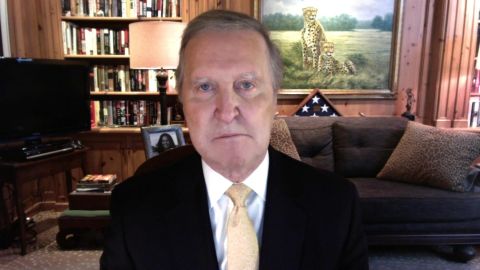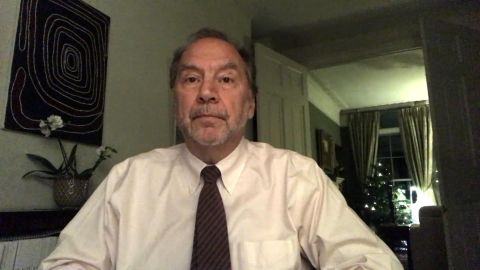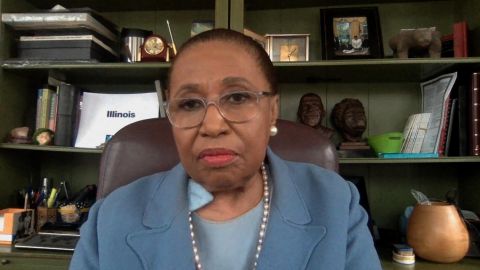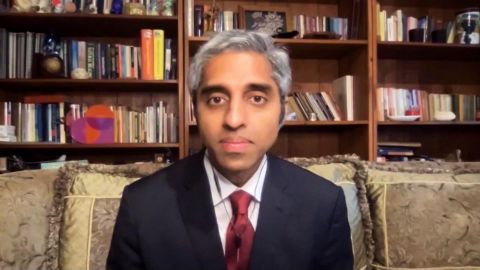Read Transcript EXPAND
CHRISTIANE AMANPOUR: Now, as cases of coronavirus continue to surge in the United States, the planned speedy rollout of the vaccine there is also falling short despite promising 20 million vaccinations before the new year just over 4 million have taken place. Our next guest Dr. Vivek Murthy is co-chair of Joe Biden’s COVID-19 advisory board and he was once surgeon general, that was in the Obama administration. And now, he’s set to step back into that role for the new administration. And here he is talk topping our Walter Isaacson earlier today about what’s gone wrong in the vaccine distribution and how to get back on track.
(BEGIN VIDEOTAPE)
WALTER ISAACSON: Thank you, Christiane. And Dr. Vivek Murthy, welcome to the show.
VIVEK MURTHY, PRESIDENT-ELECT BIDEN’S NOMINEE FOR SURGEON GENERAL: Thanks, Walter. It’s really nice to be with you today.
ISAACSON: There’s this new strain of virus that’s now hit the United States. Explain to me how much more contagious do you think it is and why is it more contagious?
MURTHY: Walter, the reports that we’ve gotten so far, and it’s important to emphasize that we understand some about this new variant, but we’re still learning more. Now, the preliminary reports tell us that it is significantly more contagious and what we’re trying to understand more clearly is, is it necessarily more dangerous to an individual? Is it more lethal? And does it have any effect on the protection one would get from the vaccine? The answer to those two questions at this point seem to be no, which is reassuring, that it does not seem to be more dangerous so it should be suspect susceptible to the vaccine. But these are questions we’ve got to continue investigating. This new variant seems to have a number of changes in its genetic code, and those changes affect how the virus behaves. The concern is that even if it turns out to not be more dangerous but it is much more contagious, that could have a significant impact on us in the United States. We already have hospitals that are filled up. We have a health care workforce that is strained and has been strained for many months no. And so, we don’t have a lot of reserve right now which is why it’s so essential that we do everything that we can like wearing masks, keeping our distance and washing our hands, avoiding indoor gatherings to help limit the spread of this virus. And that’s the good news, Walter, which is that these same measures we’ve been talking about for months, they also work to help prevent the spread of this new variant.
ISAACSON: But this new variant being more contagious, I’ve read somewhere that it’s because it has a higher viral load in your system. Wouldn’t that make it more likely to overwhelm a vaccine?
MURTHY: Well, the way the vaccine works is it generates an immune response from you, and then that immune response in turn can be directed against the virus whenever you are challenged with it or exposed to it. So, the fact that this virus generates a higher viral load in and of itself does not mean that the vaccine won’t be effective. What it does raise concern for is that we got to look more deeply at our genomic surveillance here in the Unites States. In other words, how good are we doing at detecting these new variants when they pop up? Well, to detect that you got to sequencing and examining a good chunk of the virus strains that pop up and the number of causative cases that occur in the country. In the United States, we’ve been, I think, quite behind in sequencing enough virus to understand if there are new variants. The U.K., for example, sequences a very high portion of their viruses compared to us, which is why they likely detected it before many other countries did.
ISAACSON: So, when you come in as surgeon general on January 20th, is that something you’re going to go do which is increase the capacity of hospitals around the country to sequence the virus to see if it’s mutating?
MURTHY: Well, that is one of the areas that we have been talking about is how to work with our incoming CDC director, Dr. Rochelle Walensky, and others on our team to ensure that we are in fact strengthening our ability to do genomic surveillance. We have the tools to do it and we have the knowledge on how to do it. We’ve got to build is an expanded and more effective system in actually making that surveillance happen.
ISAACSON: We now have more than 350,000 deaths in the United States and probably worse than any other country around the world by some metrics. What did we do wrong and what can you do on day one to help turn this around?
MURTHY: Well, the numbers are just staggering, Walter. And the lives lost, the lives profoundly altered, the people who are left behind and whose loved ones are no longer with them. These effects will be with us for years and years to come, and we can never forget what happened here because we can never let it happen again. I think there are a few things that we’ve got to keep in mind and we’ve got to learn from this. Number one, we’ve got to learn that you can’t fight these pandemics if you’re divided. We have to have unity as we approach this, and that means unity has to come from our federal state and local leaders. The second thing we’ve got to recognize is that science is an essential part of the solution here. We’ve got not only invest in science but communicate clearly about what the science says to tell us how to protect ourselves from the virus, but also to help people understand, as the scientists are learning as well, and that, you know, has not always happened well over this last year. We’ve had contradictory informations about the virus. We’ve had — you know, and that has sown distrust. But I think the third and most important thing here is we’ve also got to recognize that this — overcoming these pandemics is a true partnership with people across the country. This is not the federal government comes in and lays out a set of recommendations and people follow it and everything gets better. But we actually need dialogue. The government needs to hear from and understand from people about what’s working and what’s not working on the ground. And the onus is really on the government to set up the opportunities and channels and settings where it can get that feedback.
ISAACSON: But 12 million doses of the vaccine have been distributed and only 3 million have been administered. How do we get ourselves back on track?
MURTHY: Well, what we’ve got to do, first of all, is we’ve got to understand why there’s a boltleneck there. And we’re hearing from governors, directly from people on the ground, you know, about various challenges that are surfacing right now. Some are saying, for example, that they are having problems actually matching the supply they have with the people who need them, and they are feeling too constrained, you know, by current, you know, guidelines and priority schedules. Others are telling us that they don’t have necessary people to administer the vaccines to actually meet the demand. And still others are saying that they are encountering hesitancy, that they are taking the vaccines to nursing homes, to other clinical settings and many people are refusing the vaccines. So, as we understand the bottlenecks, we’ve got to build plans actually to rapidly address them and we’ve got to do so not sitting in the federal government but also working hand in hand with states and communities since they understand their communities the best. That’s a lot of the work that we’ve actually been doing during this transition, myself and other members of the incoming Biden administration. And we’ve been working to also try to understand with the current administration what their plans are and how much they have developed. And so, we’re doing that work in earnest, but there’s not a day to be wasted because every day that a vaccine goes unused and sits on the shelf is a person whose life it could be saving and that’s — we’ve got to close that gap as soon as possible.
ISAACSON: I was shocked to read that more than 20 percent of frontline health care workers in Los Angeles were declining to get the vaccine. How much of a problem is people resisting the vaccine, not wanting it?
MURTHY: Well, I think vaccine hesitancy in many populations is a real concern, and I think if we forgot that, if we overlook how important it is, I think we will not be able to get the vaccine to everyone who needs it. But there are a couple of things that I find interesting and to some extent reassuring about this challenge. Number one, the numbers have actually been improving since the early fall in terms of vaccine hesitancy. In other words, more people are saying that they will and wanted to take the vaccine now than there were in September. The second thing to recognize though is in many of the groups where the vaccine hesitancy rates are high, that hesitancy is not deep-seeded in the sense that it’s not based on a deep inherent distrust of vaccines but rather, in many cases, people are worried about whether they will get COVID from the vaccine, and the answer is no, or they are worried that the side effects could be life-threatening. And what we’ve seen is that the side effects from these vaccines tend to actually be quite minor in terms of, you know, soreness of the arm, sometimes achiness for a few days but temporary symptoms that tend to go away. And so, what we can do and need to do is to make sure those people have the right information and the data seems to tell us that with the right information from trusted messengers that those views will shift. And so, I think we have to, you know, take it upon ourselves to figure out how to do we build up the best possible public information campaign around this. This is not about trying to convince people, you know, to all do one thing. It’s about providing them with the best information from people they trust so they can make good decisions for themselves.
ISAACSON: Given the resources that we have in America, aren’t you frustrated by how we tackle this so far?
MURTHY: Well, Walter, I do think that we are blessed to have more resources than just about any other country in the world. And in the setting of that it is deeply troubling to see how many people have struggled looking for food, looking for housing, who worried about whether they’re going to be able to pay their rent during this pandemic. And often through no fault of their own. We know so many children, for example, who are not in school, are not able to get their free and reduced lunches that they and their families have relied on. We know that the job losses that have accompanied this pandemic have pushed many people over the edge and literally out of their homes. There’s no reason in a country as blessed as ours, as resourced as ours, that people should have to struggle in that way. And I actually think that the spirit of the country is such that we do want to come together and support each other during these difficult times, but what’s required to do that is for the government to the also play its part in making sure that those resources get to people who need them during those times of need. I think we can do much better in that department.
ISAACSON: And as a public health official, does it bother you, does it enrage you even all the mistakes that seemed to have been made over the past nine months?
MURTHY: Well, the past certainly has had its share of extraordinary frustrations. We could have been more in sync and unified in how we went to communities across the country to talk about the measures that needed to be taken, including the wearing of masks. We could have been more, I think, focused and more urgent in actually getting people to the resources they needed as so many people struggled during this pandemic with jobs and with hunger and with housing. These are places where we could have done better. And my hope going forward is that we will learn from this, that we will never again allow a circumstance where politics divide us in the face of a pandemic, where we will never allow our government to fall short in the ways that it is falling short and that we’ll hold those to account both those of us who may serve in government and those of us who may vote for those who serve in government to ensure that we have thoughtful, capable, honest leaders there to deliver the results that we need.
ISAACSON: How good is the coordination between the outgoing administration and your incoming administration?
MURTHY: Well, it’s certainly better than it was in the beginning in the sense that we now have the opportunity to speak with people who are inside the administration and understand a little bit more about their plans. I think our hope is that cooperation will continue to increase because like I said, we don’t have time to waste and there’s a lot of information we still need access to and that we are going to rely on in order to build the best possible plan. So, we’re approaching this with the infection of collaboration here. Many of the people we’re talking to and want to talk to actually in the administration are career officials. They are people who will be there actually after January 20th, people who, in many cases, we worked with before, those who have served in government, who we’ll work together with again, but that cooperation is really essential and that’s one of the things that we’re hoping will continue to increase in the days ahead.
ISAACSON: A year or two ago you wrote a fantastic book, you know how much I liked it, called “Together,” which was about the epidemics of loneliness and how that becomes a health issue. Very prescient before COVID struck. How bad is this loneliness that has got to the have been exacerbated by this pandemic?
MURTHY: Well, Walter, thank you and I certainly feel deeply concerned more so than I was even a year ago about the crisis of loneliness in our country. One of the things that I learned when I was surgeon general, something that I learned, in fact, from people around our country who taught me through conversations and town halls was that many people are, in fact, struggling with the sense of isolation, of feeling like they are out there on their own, that there’s nobody really to support them during difficult times. And what we learned also through this science is that loneliness is consequential for your health. People who struggle with loneliness have a higher risk of premature death and heart disease and dementia and depression and anxiety. So, there’s consequences for mental and physical health. And during this pandemic, while some people have had the wonderful opportunity of bubbling with and spending more time with their families, many others have not had that opportunity. They have, in fact, become more isolated and they have not been able to see the people they care about. And so, I’m deeply concerned about the physical and mental health impacts of loneliness during this pandemic. But I also think that we have an opportunity here to recognize something this pandemic is underscoring for us, which is that we need each other. Our relationships with each other really do matter. And as we come out of this pandemic, if we want to come out stronger and more resilient, then we’ve got to invest in those relationships and our individual lives as well as institutions, schools and workplaces, there’s government. How can we lay the foundation for healthy relationships? How can we support children in building those healthy relationships from the earliest ages? How can we in workplaces support human connection and recognize that it’s not just good for people but it’s good for businesses and organizations when people are connected, when they are helping one another? So, I hope that we will come out of this with a greater appreciation for the power of human connection.
ISAACSON: As surgeon general, you’re going to have to look at mental health. What mental health issues both from the coronavirus and kids who had to grow up with this and didn’t have the type of connections for a year or so are you going to be dealing with? How are you going to be dealing with the mental health issues?
MURTHY: Well, the mental health impacts of COVID is one of the great costs, the unseen costs of, you know, COVID-19. We already saw earlier this year, according to the CDC, that rates of depression, anxiety and suicide had dramatically increased compared to 2019. So, seen an (ph) increase in just a year’s time. And what we’re going to have to do is — there’s a number of things. Number one is to recognize and speak about that mental health impact. Still to this day, many people feel ashamed of depression and anxiety, and they don’t talk about it. They don’t want people to know that they are struggling. We’ve got to normalize that and help people talk about what they are going through. The second thing we’ve got to the do is we’ve got to provide better systems for helping people. We already knew before the pandemic that our mental health care system was not as strong as it needed to be. It wasn’t well- funded. It was wasn’t well-integrated into the primary care system. People were still finding problems with insurance adequately covering their mental health care, and so they weren’t getting care. We’ve got to close those gaps. But I’ll end with this also, that one of the most powerful things we can do to strengthen our mental health is to actually invest in human connection. It’s our relationships that turn out to be a powerful antidote to depression, to anxiety, to loneliness. And so, I think part of what we have to re-examine as individuals and families, as communities and society more broadly is how can we put relationships back at the center of our lives. And I think if we as a country are going to come out of this stronger, we don’t just need a better public health systema and health care system, we don’t need better pandemic response systems in government, but we also need to strengthen the fabric of society which is found, you know, in our relationships with one another. When we are disconnected, it’s hard for us to come together and address big challenges, whether it is the pandemic or the ills in our health care system or climate change or economic inequality. We rely on those connections being strong for the nation and for our communities to be strong, and that is, I think, going to be one of our most important areas of focus and investment going forward.
ISAACSON: Dr. Vivek Murthy, thanks so much for joining us.
MURTHY: Well, thank you so much, Walter. So nice to be with you and good to see you again.
About This Episode EXPAND
Virologist Peter Piot explains why new COVID-19 variants are causing concern amongst scientists. Former Defense Secretary William Cohen reacts to President Trump’s phone call with Georgia’s secretary of state. Former Sen. Carol Moseley Braun discusses tomorrow’s senate runoff election in Georgia. Dr. Vivek Murthy explains what’s gone wrong with vaccine distribution.
LEARN MORE



